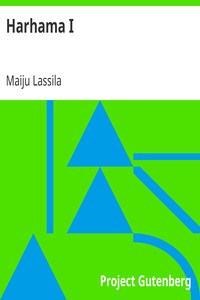| Summary |
"Harhama I" by Maiju Lassila is a novel written in the early 20th century. The book delves into deep philosophical and spiritual themes, exploring the divine and the human condition through the eyes of its main character, Harhama. The narrative appears to grapple with existential questions about life, faith, and the struggles of human existence against a backdrop of theological discourse. The opening of "Harhama I" presents a lyrical and contemplative introduction that reflects on the nature of God and the universe. It opens with a poetic exploration of creation, emphasizing humanity's frail existence in contrast to the divine. The scene shifts to a monk, who is engaged in fervent prayer and reflection, seeking to convey the greatness of God through his writing. As Harhama enters the monk's chamber, a conversation unfolds about the nature of life's purpose, possessions, and the essence of true fulfillment. The dialogue reveals Harhama's aspirations and plans for a future with his fiancé, but it also raises profound questions regarding the true meaning of life and existence, suggesting that mere earthly ties may not constitute a genuine foundation for happiness. (This is an automatically generated summary.)
|

